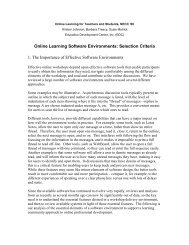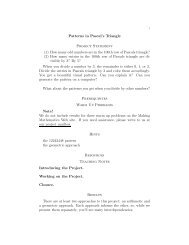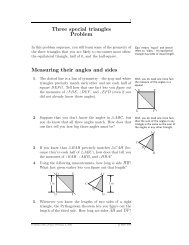It is critical to overcome the digital divide - Education Development ...
It is critical to overcome the digital divide - Education Development ...
It is critical to overcome the digital divide - Education Development ...
Create successful ePaper yourself
Turn your PDF publications into a flip-book with our unique Google optimized e-Paper software.
and a sense that boys act like <strong>the</strong>y know more (Gokhale & Stier, 2004). Clewell and Burger(2002) argue that “future efforts must include interventions <strong>to</strong> change <strong>the</strong> system of science andengineering so that it becomes more accepting of women (and o<strong>the</strong>r underrepresented groups)”(Clewell & Burger, 2002) p.252. Brown-L’Bahy posits, “Girls who appear <strong>to</strong> res<strong>is</strong>t computer usemay be res<strong>is</strong>ting content matter or particular purposes or types of computer use” (Brunner,Bennett, & Honey, 2000; S Turkle, 1997 in Brown-L'Bahy, 2003, p.14).“The question [boils] down <strong>to</strong> at what level are people <strong>the</strong> same, and at what level are<strong>the</strong>y different from one ano<strong>the</strong>r. Th<strong>is</strong> <strong>is</strong> a good and important realization paralleled in <strong>the</strong>field of anthropology. Notions of culture often imply that a particular group of people,whe<strong>the</strong>r <strong>the</strong>y are a racial/ethnic group, or a gender group, or a socio-economic group, are all<strong>the</strong> same and <strong>the</strong>re <strong>is</strong> no internal group diversity. Th<strong>is</strong> tendency <strong>to</strong> see culture ashomogeneous has led <strong>to</strong> group stereotyping and a failure <strong>to</strong> understand <strong>the</strong> complexity ofdiversity.”Wesley Shumar, Ass<strong>is</strong>tant Professor of Culture & Communication, Drexel UniversityValues and technologyZuga claims that women have a “different way of knowing” than men, and <strong>the</strong> field oftechnology (and science) needs <strong>to</strong> incorporate those different ways of knowing (Zuga, 1999).She argues that technology <strong>is</strong> not a value-free science, and it must address ethical <strong>is</strong>sues, such asenvironmental<strong>is</strong>m, in order <strong>to</strong> appeal <strong>to</strong> women.More technology educa<strong>to</strong>rs could begin <strong>to</strong> address <strong>the</strong> subject of technologyeducation with a <strong>critical</strong> view focusing on <strong>the</strong> role of technology as a system andas practice in which <strong>the</strong>re are choices about our future course of action…Implementing a social reconstruction curriculum design in technology educationencourages thoughtful critique of <strong>the</strong> status quo and ex<strong>is</strong>ting practice with respect<strong>to</strong> technology (Zuga, 1999).10
















